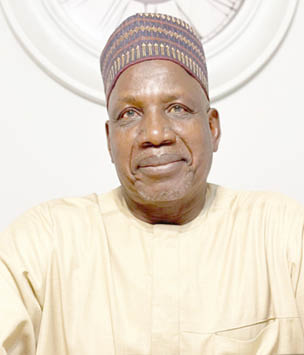Professor Auwalu Yadudu, one of Nigeria’s foremost constitutional lawyers, recently retired as an academic from Bayero University, Kano (BUK), where he served as Dean of the Faculty of Law. In this interview, the former legal adviser to the late military president, General Sani Abacha, shared his thoughts on the clamour for a switch to the parliamentary system of government, as well as the perennial constitutional amendment processes in the country.
There has been a recent surge in the clamour for a switch to the parliamentary system of government originating from a group of lawmakers in the House of Representatives, who have been consulting with eminent Nigerians on this. What is your take on this clamour?
My take is that I don’t quite understand what they are looking for. This is a system we operated some 65 years ago and there are not so many people alive with the knowledge of how it worked. In my view, I see a lot of problems with the parliamentary system. Number one, it is a system which is prone to so much instability. The leader of a majority of parties in the parliament continues to lead the government. The way politicians change their parties with whims and caprices, we can have so much instability in the country that within one year we can have government changing many times. I don’t think we are prepared for that kind of turbulence in political terms.
Secondly, a president is elected by the entire country, and of course, we have a system that ensures that whoever becomes a president receives not only the majority acceptance of the area where he comes from, but actually, he has to show territorial spread. And I don’t see that in any parliamentary system, which really means you only represent your constituents.
- Ooni backs Nigeria’s return to parliamentary system
- 60 Reps Propose Bills To return Nigeria to Parliamentary System
A president of Nigeria could only be one representing Dala in Kano State, and he has no presence, he has no showing, he has no following in even talking about Kaduna or southern Nigeria. So, in a way, the good thing about territorial acceptance, which the presidential system ensures, would be rubbished if you went back to a parliamentary system. Of course, one does not know what exactly they mean by that.
The third reason is that it has been touted that it is going to be inexpensive. I think people say it because of nostalgia of our leaders in the past. Our leaders in the past were frugal and very diligent and responsible with resources, not because they were operating a parliamentary system but because by nature they were honest, they were good leaders, and they went by the book. So, it is not so much the parliamentary system that made our leaders to be good and to be prudent with resources.
And, of course, lastly, you simply don’t know what exactly a parliamentary system will throw out for you because I can imagine the kind of instability, political inertia, and even the total chaos in the country if you were to go for a parliamentary system of government, which is so prone to instability. And given our ethnic, religious and geopolitical differences, I don’t see people really minding their business and allowing the system to work for five years.
You talk about the turbulence in the polity due to the shifting dynamics in Nigerian politicians’ attitude. But don’t you think this might lead to a system where the majority continue to rule the country infinito?
Well, that is why I said those who are clamouring for it really have no idea of what obtains. If you go back down memory lane, the northern region of Nigeria had the largest number of parliamentarians, and they would continue either of themselves or in coalition with whomever they wanted to co-opt to govern the nation. There is no issue of rotation, there is no issue of zoning, there is no issue of give and take, actually. The party with the majority of members in parliament can continue to govern for as long as it can either have an absolute majority from its area or simply co-opt a few members from other parts of the country and form a government.
So, you see, I blame this agitation for parliamentary system for two reasons. One, I think those who are the fiercest advocates of it are people who are over 90 years of age, like Ayo Adebanjo, Edwin Clarke, and in the North, I think we have people like Ango Abdullahi. These old people who have had some idea of it are nostalgic, but the young ones do not have an idea really how it worked then and how it will work. I can tell you that it will be a recipe for total inertia, confusion, instability and chaos if you are to go back to it. Of course, I keep saying that one does not know what exactly they want by parliamentary system of government.
In the present dispensation that we have a lot of people raising concerns about marginalization, or in the case of party politics, you hear talks about rotation and zoning. How will this play out in the parliamentary system because you hinted at the absence or rotation?
Honestly, it is very clear that if you want to go for a parliamentary system of government, where the leader of the majority in parliament leads the government, there is no issue at all about zoning or rotation, or any of those give and take concessions that we have over the years built through the operation of the presidential system of government.
I keep going back to the point that one does not know exactly what sort of parliamentary system of government they want to install. Even if you think about the Indian example, India is a diverse country, but it is still a parliamentary system which really only goes for the leader of the party with the majority of members in the parliament, regardless of its appeal to others. Precisely, what is happening in India is that you have a president from a party that is very divisive and is walking all over everybody and it doesn’t care because it’s able to get the majority of votes. It can continue to govern forever.
By the way, with a parliamentary system of government, you are not only not going to talk about rotation or zoning, there is no term limit. If a party is able to produce majority of members of parliament after every election cycle, which is usually five years, it can continue to govern the country. And the same leader of that party can continue to govern for as long as the party continues to gather sufficient majority. In England, Tony Blair was there for 10 years, Margaret Thatcher for 12. Right now, the Tory Party in England could have had one leader for the past 12 or 13 years they have been in power except for their own internal problems and some of the things that have happened.
If that is what people are advocating in Nigeria, I don’t think it would work. And I don’t think people would support the idea. I think the clamour has more to do with inexperience and nostalgia, not reality.
What is the way forward in getting Nigeria better?
First of all, to be fair to them, I would like them to spell out what they want. But if it is about reduction in the cost of governance, there are other ways within the given system. Essentially, if you go for good leaders who will play the ball according to the rules, it matters not whether it is parliamentary or presidential system of government that we operate. But it is time to generate ideas, maybe they will be able to convince enough Nigerians on this. You never know.
Over the years, there have been constitutional amendments, which a lot of people believe have not yielded the most desired impact. What, in your view, would be a more effective system for a constitutional amendment?
It is not a popular view. I think the incremental amendment we have seen over the years is unavoidable. The American presidential system and constitutional amendments took very many years. We seem to be in a hurry. We feel we want to change the constitution overnight. It doesn’t work that way. If we are truly seeking to improve on the constitution, we can continue to amend it incrementally and perfect things. It is never a word that is cast in stone; you keep changing and tweaking it. The American institutions we borrowed from also took several decades, even over a century, to improve it.
Changing a society or political institution is not done overnight, it requires a lot of efforts.
Some pundits, also making reference to the American style, have advocated that it may be more pragmatic for lawmakers to focus on key issues for every round of constitutional amendment instead of trying to accommodate as many as possible. What is your take on this?
Well, it has to do with elite consensus and the general public. I think it will be the tidiest and most preferable thing to choose a number of key fundamental issues to go to amend them, and therefore, wait for another opportunity to attend to the other issues. By the way, members of the National Assembly, in the last two exercise, have been able to choose a number of key issues. They may not be as fundamental as the public wants, but they came up with bills addressing only specific issues, for example, autonomy to local government, judicial council, state assembly or electoral reform.
It is also good to recognise that the constitutional amendment exercise is not entirely governed by the National Assembly. It has to get the acceptance of at least two-thirds of states (assemblies) of the federation.
You will also have to contend with the ascent of the president. So you can do all this rigmarole, get everybody to agree, and then, maybe Mr President would withhold his ascent, then everything goes away. So I think, as you suggested, it would be good to continue with this tradition they have started.

 Join Daily Trust WhatsApp Community For Quick Access To News and Happenings Around You.
Join Daily Trust WhatsApp Community For Quick Access To News and Happenings Around You.


